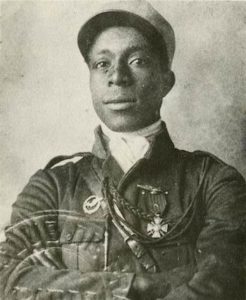
Eugene Bullard
Eugene Bullard was born on this date in 1895. He was a Black aviator.
He was born Eugene Jacques Bullard in Columbus, GA, one of 10 children. His father was known as "Big Chief Ox," and his mother was Native American (Creek). Bullard stowed away on a ship bound for Scotland to escape Jim Crow segregation (he later claimed to have witnessed his father's narrow escape from lynching as a child). While in the United Kingdom, he worked as a boxer and in a music hall. Living in Paris, he joined the French Foreign Legion upon the outbreak of war in Europe in 1914. Wounded in the 1916 battles at Verdun and already awarded the Croix de Guerre, Bullard transferred to the Lafayette Flying Corps in the French Aéronautique Militaire.
He was assigned to the 93 Spad Squadron on August 17, 1917, where he flew some 20 missions and is thought to have shot down two enemy aircraft. With the entry of the United States into the war, the US Army Air Service convened a medical board in August 1917 to recruit Americans serving in the Lafayette Flying Corps. Although he passed the medical examination, Bullard was not accepted into American service because (at the time) Blacks were barred from flying in American service. Bullard was discharged from the French Air Force after a fight with an officer while off duty and was transferred back to the French infantry in January 1918, where he served until the Armistice.
Following the war's end, Bullard remained in Paris, working in nightclubs and eventually owning his own. He married the daughter of a French countess, but the marriage soon ended in divorce, with Bullard taking custody of their two daughters. His nightclub work brought him many American friends, including Josephine Baker, Louis Armstrong, and Langston Hughes.
At the beginning of World War II in 1939, Bullard (who spoke German) agreed to a French request to spy on German agents frequenting his club in Paris. After the German invasion of France in 1940, Bullard took his daughters and fled south of Paris. In Orleans, he joined a group of soldiers defending the city, where he was wounded.
He fled to Spain, and in July 1940, he returned to America. Bullard spent some time in a hospital in New York for a spinal injury, but he would never fully recover. When seeking work in the United States, he found that fame in France had become discrimination in New York. He worked as a perfume salesman, a security guard, and an interpreter for Armstrong, but his back injury worsened. For a time, he attempted to regain his nightclub in Paris. Still, his property had been destroyed during the Nazi occupation, and he settled for a financial settlement from the French government, allowing him to purchase an apartment in Harlem.
In the 1950s, Bullard's daughters married, and he lived alone in his Harlem apartment, which was decorated with pictures of the famous people he knew and a framed case containing his 15 French war medals. His final job was as an elevator operator at the Rockefeller Center, where his fame as the “Black Swallow of Death” was unknown.
In 1954, the French government invited Bullard to Paris to participate in rekindling the everlasting flame at the Tomb of the Unknown Soldier under the Arc de Triomphe. 1959, he was made a chevalier (knight) of the Legion of Honor. Even so, the last years of his life were spent in relative obscurity and poverty in New York City. According to many, the first Black military pilot died of stomach cancer on October 12, 1961.
He was buried with honors by French War Officers in the French War Veteran's section of the Flushing Cemetery in New York. In 1972, his exploits as a pilot were put in print with the book "The Black Swallow of Death." On August 23, 1994, 33 years after his death and 77 years after his rejection from U.S. military service in 1917, Eugene Bullard was posthumously commissioned as a 2nd Lieutenant in the U.S. Air Force.